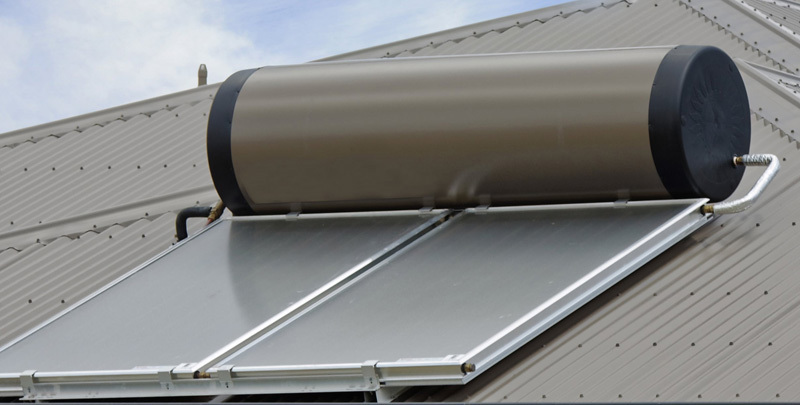
How Effective are Solar Water Heaters?
Solar water heaters have gained increasing popularity as an eco-friendly and cost-efficient alternative to traditional water heating systems.
In this comprehensive guide, we will delve into the workings, advantages, installation processes, and maintenance costs of solar water heaters.
Solar Water Heaters Over the Years
The history of the solar water heater is a testament to human ingenuity and the quest for sustainable energy solutions—the concept of harnessing solar energy for heating water dates back to ancient civilisations.
The Greeks, for instance, used reflective materials like mirrors to concentrate sunlight and heat water in cauldrons as early as the 3rd century BC. Solar water heaters gained popularity during the energy crises of the 1970s, with innovative developments in design and materials.
These systems have evolved to become more efficient, cost-effective, and environmentally friendly. Today, solar water heaters are crucial in reducing energy consumption and greenhouse gas emissions, making them a cornerstone of the renewable energy movement.
The Latest in Solar Water Heating Systems
Solar water heaters harness the sun’s power to provide your home with hot water. This renewable energy technology is a beacon of sustainability, offering an environmentally conscious way to meet your household’s hot water needs.
As we grapple with the pressing issue of climate change and rising energy costs, embracing energy-efficient and eco-friendly water heating options like solar water heaters is not just a choice; it’s a necessity.
How Solar Water Heaters Work
Solar water heaters work on a straightforward principle. They use solar collectors to absorb sunlight, convert it into heat, and then transfer it to your water supply.
It is accomplished only by heating water through a fluid (often a heat-transfer fluid like antifreeze) that circulates between the collector and a storage tank. The heated fluid then warms the water in the tank, making it ready for use.
Types of Solar Water Heaters
There are two primary types of solar water heaters: active and passive systems. Dynamic systems use pumps to circulate the heat-transfer fluid, while passive systems rely on natural convection.
The choice between these two types depends on factors such as climate, installation cost, and your specific solar hot water needs.

Advantages of Solar Water Heaters
What do you think are the advantages of solar water heaters? Learn more below:
-
Reduced Energy Bills and Cost Saving
One of the most significant benefits of solar water heaters is reducing energy bills. By harnessing the sun’s energy, you can significantly lower your dependence on conventional energy sources, resulting in substantial long-term cost savings. Solar water heaters can help reduce a household’s reliance on external energy sources, such as electricity or natural gas. It can provide a measure of energy security, especially in regions prone to power outages or price fluctuations.
-
Environment-Friendly
In the era of climate change, reducing your carbon footprint is vital. Solar water heaters produce hot water without emitting greenhouse gases, making them a sustainable choice that benefits the environment.
-
Reliable and Long-Lasting
Solar water heaters are known for their reliability and longevity. With proper maintenance, they can serve you for decades, offering consistent hot water even during power outages. It means you’ll have reliable access to hot water for an extended period without significant maintenance or replacement costs.
-
Helps the Economy
- Return on investment (ROI): Over time, the money saved on energy bills can offset the initial cost of purchasing and installing a solar water heater. The payback period for the electric hot water system, or the time it takes to pay for itself through energy savings, can vary depending on factors like the system’s cost, location, and local energy prices. Still, it typically takes a few years.
- Increased property value: Solar water heaters can enhance the value of a property. Many homebuyers will pay more for homes with energy-efficient features like solar water heaters. It can be especially beneficial if you plan to sell your property.
- Government incentives and rebates: Various governments worldwide offer financial incentives and tax credits to encourage the installation of solar water heaters. These incentives can significantly reduce the upfront costs of purchasing and installing a solar water heating system here, making it a more attractive investment.
- Job creation: The solar industry, including the installation and maintenance of both solar panels and water heaters, creates jobs in manufacturing, sales, installation, and maintenance. It can have positive economic effects at the local and national levels.
Factors Affecting Effectiveness
Below are the factors affecting the effectiveness of the solar water heaters:
- Location and climate considerations: The effectiveness of a solar water heater depends on your geographical location and local climate. Areas with abundant sunlight will improve performance, while regions with less sun or extended periods of cloudy weather may require additional considerations.
- Solar collector efficiency: The efficiency of the solar collector plays a crucial role in the system heat pump’s effectiveness. High-quality, efficient collectors can convert more sunlight into heat, ensuring a reliable hot water supply.
- System size and capacity: The exemplary system size and capacity are essential to meet your hot water demands. Oversized or undersized hot water systems may result in inefficiencies.
- Maintenance and upkeep: Regular maintenance is essential to ensure the long-term effectiveness of your solar water heater. Cleaning the collectors, checking for leaks, and verifying the solar system’s components are functioning properly are all part of a maintenance routine.

Installation Process
The installation process of solar water heaters by professionals typically involves several key steps to ensure an efficient and effective system. Here’s a brief overview of the typical installation process:
- Site assessment: Professionals begin by conducting a thorough site assessment to determine the best location for the solar panels and the water storage tank. Professionals consider factors such as sunlight exposure, roof conditions, and local climate.
- Mounting the solar panels: Solar panels, also known as collectors, are securely mounted on the roof or another suitable location to receive maximum sunlight exposure. Proper orientation and tilt angles are crucial to optimise energy capture.
- Plumbing and piping: Professionals make plumbing connections to link the solar collectors to the existing water heating system. Heat transfer fluid or water is circulated through the collectors to absorb solar energy and transfer it to the storage tank.
- Installation of storage tank: A well-insulated storage tank is installed indoors, preferably close to the point of use. This tank stores the heated water for later use, ensuring a continuous hot water supply.
- Backup system integration: In regions with occasional low sunlight or increased hot water demand, a backup heating system (usually electric or gas) is integrated into the setup to ensure a reliable hot water supply.
- Control and monitoring: Professional installers set up control systems and sensors to regulate the flow of heat transfer fluid, monitor temperatures, and ensure the system operates efficiently and safely.
- Testing and commissioning: After the installation, professionals conduct thorough testing to ensure the system functions as intended. It includes checking for leaks, proper circulation, and temperature control.
- Training and documentation: Professionals often provide homeowners with user manuals and guidance on system operation and maintenance. Professionals may give training to ensure effective system usage.
- Final inspection and cleanup: Once the system is operational, installers conduct a final inspection to ensure everything is in order. They also clean up the installation site, leaving it in good condition.
- Maintenance recommendations: Professionals typically advise homeowners on regular maintenance requirements, such as checking for leaks, cleaning collectors, and inspecting the system periodically.
By having solar water heaters installed by professionals, homeowners can enjoy the benefits of efficient hot water generation while ensuring the longevity and reliability of the system. It’s essential to work with qualified installers experienced in solar water heater installations to maximise the system’s performance and lifespan.
Maintenance and Troubleshooting
Here are the maintenance tips that you should know about solar water heaters:
- Routine maintenance tasks: Routine maintenance includes cleaning the collectors, checking for leaks, inspecting pipes, and ensuring all components of the gas hot water system are in working order. We highly recommend an annual check-up.
- Common issues and how to troubleshoot: Issues such as low hot water production or a drop in system efficiency may arise. Understanding these issues and troubleshooting them can save you time and money.
- Professional servicing recommendations: For more complex issues and periodic servicing of the electric water heater itself, it’s advisable to hire a professional technician with expertise in solar water heaters.
Comparing Solar Water Heaters to Traditional Systems
When comparing solar water heaters to traditional systems, it becomes evident that they offer a more sustainable and cost-effective way to meet hot water needs. Unlike conventional systems that rely on fossil fuels or electricity, solar water heaters harness the sun’s power to heat water, reducing energy bills and carbon emissions.
Solar heaters are environmentally friendly and require minimal maintenance. While the upfront costs may be slightly higher, the long-term savings and reduced environmental impact make them a compelling choice for those seeking an eco-conscious and economical solution for their hot water requirements.
Make It Your Choice
Solar water heaters are highly effective and sustainable for meeting hot water needs. By harnessing the sun’s energy, you can enjoy reduced energy bills, eco-friendly water heating bills, and long-term reliability.
As we move towards a greener future, adopting solar water heaters is a practical step that benefits your wallet and the planet.
Stay tuned for future advancements in this technology as the potential for even more efficient solar water heaters grows.
Please note: This information is provided for advice purposes only. Regulations differ from state to state, so please consult your local authorities or an industry professional before proceeding with any work. See our Terms & Conditions here.
Published: 2023-11-28

















